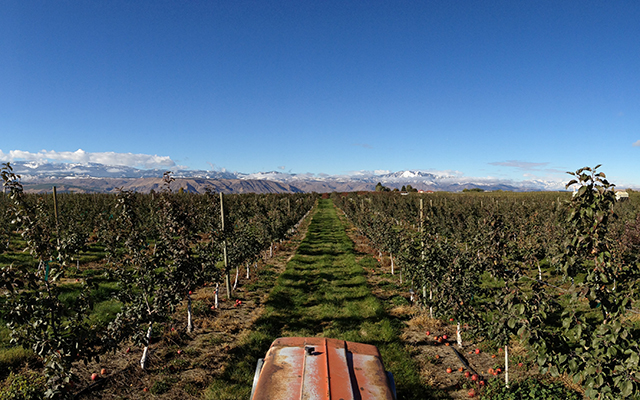A Farmer’s Case Against the Farm Bill
Kelsey Lucas /
Farming can be a risky business, but Britt Dudek thrives off the uncertainty. It’s a part of farming he defines as freedom—a freedom he refuses to let government take away.
“Farming gives you the freedom to succeed and the freedom to fail,” said Dudek, who took over his family’s farm after his father died in 1995.
Dudek Orchards LLC, formerly Dudek Inc., has grown fruit trees since 1968 in the Wenetchee area of Washington state, and has seen its share of both success and failure.
In the early 2000s, the Dudek farm was losing money and Britt turned to the federal government for help. As a result, he encountered new rules and regulations that dictated how he must farm. That experience motivated him to never again rely on government subsidies.
“When you tie yourself up with [subsidies],” Dudek said, “you farm the way the government tells you to farm.”
Today, instead of depending on a taxpayer-funded “safety net,” Dudek produces and saves off-farm income to compensate for any downturns his farm may encounter.
Life As a Farmer
Apple farming requires a significant replanting process every few years — a practice that can take more than five years until trees are in full production. Even though this process produces a better product, Dudek said it can result in a “big dip in income level.”
But low fruit returns don’t hinder him from providing for his family or force him to enroll in government farm programs for support. Dudek always makes sure he has other forms of income to supplement the income from his apple farming.
“If the farm isn’t making you money, then you use whatever education or skills you have to find income off the farm,” Dudek said. “I don’t want to be a ward of the government.”
But most commodity producers Dudek knows rely on crop insurance. Unlike other farm programs that have caps, there’s no limit on the amount of premium subsidies farmers can receive from crop insurance.
An Inside Look
For 10 years, Dudek utilized his degree from the University of Washington in a management role at a soil-and-water conservation office, which is part of the U.S. Department of Agriculture. He worked with the Natural Resources Conservation Service and the Farm Service Agency on farm bill programs and Title II conservation programs “quite extensively.”
Dudek’s experience gave him an inside look at how “the other players in agriculture work hard at getting the farm bill to look the way they want it to look.”
Now he prides himself on staying away from the “crony capitalism game.” If he’s given a fair playing field, he’s happy to compete, but he stressed, “there is no such thing.”
“The playing field is whatever those that can lobby hardest make it,” Dudek said.
Lobbyists and Bureaucrats
Dudak said closed-door meetings reward big lobbyists through regulations and subsidies that are “quite a challenge” for small farmers to navigate.
“These regulations that the agencies write are so incomprehensible and make so little sense to anybody on the ground,” Dudek said. “They are not farmers. They are bureaucrats, and they are steered by Washington, D.C.”
Dudek described the farm bill as a “multi-layer, complex, how-the-heck-did-we-get-here kind of system.”
As for Dudek’s family apple farm, he said he’ll continue to fight to keep the farm business to the farmers—without government interference.


